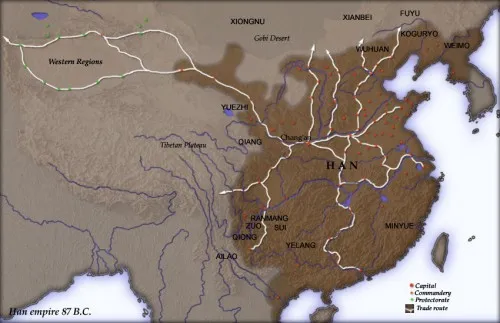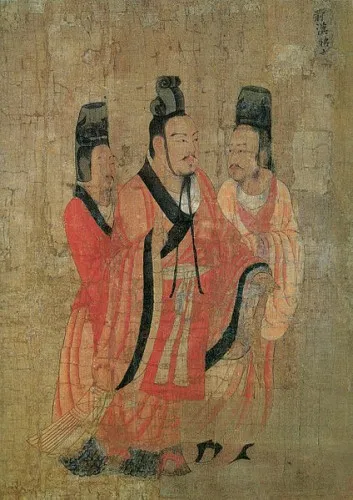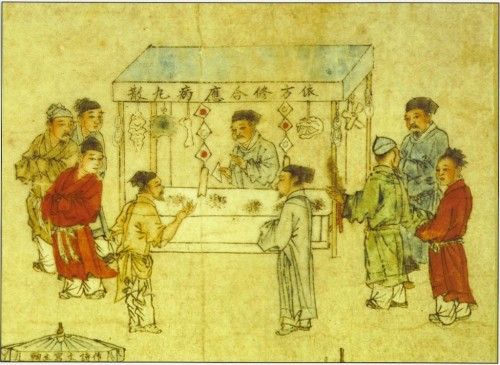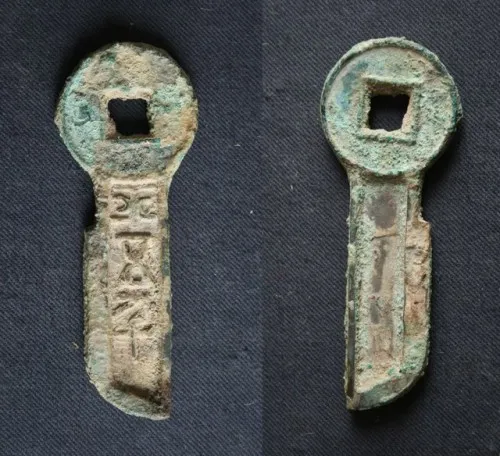Emperor Wang Mang: China’s First Socialist?
/https://tf-cmsv2-smithsonianmag-media.s3.amazonaws.com/filer/20111209092023Wang-Mang.jpg)
October 7, 23 A.D. The imperial Chinese army, 420,000 strong, has been utterly defeated. Nine “Tiger Generals,” sent to lead a corps of 10,000 elite soldiers, have been swept aside as rebel forces close in. The last available troops—convicts released from the local jails—have fled. Three days ago, rebels breached the defenses of China’s great capital, Chang’an; now, after some bloody fighting, they are scaling the walls of the emperor’s private compound.
Deep within his Endless Palace, Emperor Wang Mang waits for death. For 20 years, ever since he first contemplated the overthrow of the dissolute remnants of the the Han Dynasty, the usurper Wang had driven himself to keep to an inhuman schedule, working through the night and sleeping at his desk as he labored to transform China. When the rebellion against him gained strength, however, Wang appeared to give up. He retreated to his palace and summoned magicians with whom he passed his time testing spells; he began to assign strange, mystical titles to his army commanders: “The Colonel Holding a Great Axe to Chop Down Withered Wood” was one.
Such excesses seemed out of character for Wang, a Confucian scholar and renowned ascetic. The numismatist Rob Tye, who has made a study of the emperor’s reign, believes that he succumbed to despair. “Frankly, my own assessment is that he was high on drugs for most of the period,” Tye writes. “Knowing all was lost, he chose to escape reality, seeking a few last weeks of pleasure.”
When the rebels broke into his palace, Wang was in the imperial harem, surrounded by his three Harmonious Ladies, nine official wives, 27 handpicked “beauties” and their 81 attendants. He had dyed his white hair in order to look calm and youthful. Desperate officials persuaded him to retire with them to a high tower surrounded by water in the center of the capital. There, a thousand loyalists made a last stand before the armies of the revived Han, retreating step by step up twisting stairs until the emperor was cornered on the highest floor. Wang was slain late in the afternoon, his head severed, his body torn to pieces by soldiers seeking mementos, his tongue cut out and eaten by an enemy. Did he wonder, as he died, how it had come to this—how his attempts at reform had inflamed a whole nation? And did it strike him as ironic that the peasants he had tried to help—with a program so seemingly radical that some scholars describe it as socialist, even “communistic”—had been the first to turn against him?

Wang Mang may be the most controversial of China’s hundred or more emperors. Born into one of his country’s oldest noble families in about 45 B.C., he was celebrated first as a scholar, then as an ascetic and finally as regent for a succession of young and short-lived emperors. Finally, in 9 A.D., with the death (many believe the murder) of the last of these infant rulers, Wang seized the throne for himself. His usurpation marked the end of the Former Han Dynasty, which had reigned since 206 B.C.–shortly after the death of China’s renowned First Emperor, builder of the Great Wall and the celebrated Terracotta Army. In the Han’s place, Wang proclaimed the Xin—”new”—dynasty, of which he was destined to remain the solitary emperor.
The 14 years of Wang Mang’s reign can be divided into two parts: eight years of dramatic reform followed by six of escalating rebellion. The first period witnessed attempts to overhaul the entire system of imperial government, though whether the emperor intended to return China to the days of the semi-legendary Zhou Dynasty, which had ruled China before the Han, or introduce radical new policies of his own, remains hotly disputed. The second period witnessed the upheaval known as the Red Eyebrow Rebellion (an attempt by desperate and essentially conservative peasants to reverse some of Wang’s riskier reforms), the resurgence of the Han and the deaths of an estimated 25 million people—perhaps half the total Chinese population at that time.

Any attempt to assess Wang’s reign is beset with difficulties. Usurpers rarely enjoy a good press, but China has always treated its rebel rulers rather differently. In imperial times, it was believed that all emperors ruled thanks to the “mandate of heaven,” and hence were themselves the Sons of Heaven, practically divine. It was, however, perfectly possibly to lose this mandate. Portents such as comets and natural disasters could be interpreted as heaven’s warning to a ruler to mend his ways; any emperor who subsequently lost his throne in an uprising was understood to have forfeited heaven’s approval. At that point, he became illegitimate and his successor, no matter how humble his origins, assumed the mantle of Son of Heaven.
From the point of view of Chinese historiography, however, emperors who lost their thrones had never been legitimate to begin with, and their histories would be written with a view to demonstrating just how lacking in the necessary virtues they had always been. Wang Mang provoked a devastating civil war that ended with a large proportion of his empire in arms against him. Because of this, the historian Clyde Sargent stresses, he “traditionally has been considered as one of the greatest tyrants and despots in Chinese history.” No line of the official account of his reign views his policies as justified or positive. Even its description of his features reflects bias; as Hans Bielenstein observes, Wang “is described as having a large mouth and a receding chin, bulging eyes with brilliant pupils, and a loud voice which was hoarse.”
More recently, however, Wang Mang has undergone a startling reappraisal. This process can be dated to 1928 and the publication of a study by Hu Shih, a renowned scholar who was then the Chinese ambassador to the United States. In Hu’s view, it was the Han Dynasty that most richly deserved condemnation, for having produced “a long line of degenerate scions.” Wang Mang, on the other hand, lived simply, thought deeply and was “the first man to win the empire without an armed revolution.” Moreover, Wang then nationalized his empire’s land, distributed it equally to his subjects, cut land taxes from 50 percent to 10, and was, all in all, “frankly communistic”—a remark Hu intended as a compliment.
Hu Shih’s portrayal of Wang Mang has been hotly disputed since he wrote it, and understanding what the emperor really thought, or intended, during his reign is rendered all but impossible by the scarcity of sources. With the exception of a few coins and a handful of archaeological remains, all that is known of Wang is contained in his official biography, which appears as Chapter 99 of the History of the Han Dynasty, compiled shortly before 100 A.D. This is quite a lengthy document—the longest of all the imperial biographies that survive from this period—but by its very nature it is implacably opposed to the usurper-emperor. To make matters worse, while the History says a good deal about what Wang did, it tells us very little about why he did it. In particular, it displays no real interest in his economic policies.

The little that is known about Wang Mang’s reforms can be summarized as follows. It is said he invented an early form of social security payments, collecting taxes from the wealthy to make loans to the traditionally uncreditworthy poor. He certainly introduced the “six controls”—government monopolies on key products such as iron and salt that Hu Shih saw as a form of “state socialism”—and was responsible for a policy known as the Five Equalizations, an elaborate attempt to damp down fluctuations in prices. Even Wang’s harshest modern critics agree that his ban on the sale of cultivated land was an attempt to save desperate farmers from the temptation to sell up during times of famine; instead, his state provided disaster relief. Later the emperor imposed a ruinous tax upon slave owners. It is equally possible to interpret this tax as either an attempt to make slaveholding impossible or as a naked grab for money.

Of all Wang Mang’s policies, however, two stand out: his land reforms and the changes he made to China’s money. As early as 6 A.D., when he was still merely regent for an infant named Liu Ying, Wang ordered the withdrawal of the empire’s gold-based coins and their replacement with four bronze denominations of purely nominal value—round coins with values of one and 50 cash and larger, knife-shaped coins worth 500 and 5,000 cash. Since Wang’s 50-cash coins had only 1/20th the bronze per cash as his smallest coins did, and his 5,000-cash coins were minted with proportionally even less, the effect was to substitute fiduciary currency for a Han dynasty gold standard. Simultaneously, Wang ordered the recall of all the gold in the empire. Thousands of tons of the precious metal were seized and stored in the imperial treasury, and the dramatic decrease in its availability was felt as far away as Rome, where the Emperor Augustus was forced to ban the purchase of expensive imported silks with what had become—mysteriously, from the Roman point of view—irreplaceable gold coins. In China, the new bronze coinage produced rampant inflation and a sharp increase in counterfeiting.
Wang Mang’s land reforms, meanwhile, appear even more consciously revolutionary. “The strong,” Wang wrote, “possess lands by the thousands of mu , while the weak have nowhere to place a needle.” His solution was to nationalize all land, confiscating the estates of all those who possessed more than 100 acres, and to distribute it to those who actually farmed it. Under this, the so-called ching system, each family received about five acres and paid the state tax in the form of 10 percent of all the food they grew.

Historians are divided as to Wang Mang’s intentions. Several, led by Bielenstein, suggest that catastrophic changes in the course of the Yellow River took place during his regency period, resulting in famine, drought and flood; if this is true, it can certainly be argued that Wang spent his entire reign battling forces that he could not possibly control. But the majority of modern accounts of Wang’s reign see him as a Confucian, not a communist. Bielenstein, in his contribution to the imposing Cambridge History of China, says this, though he chooses to ignore some of the more contentious issues. And while Clyde Sargent (who translated the History of the Han Dynasty) acknowledges the “startling modernity” of the emperor’s ideas, he adds that there is insufficient evidence to prove he was a revolutionary. For Oxford University’s Homer Dubs, author of the standard account of Wang’s economic policies, the emperor’s new coins were issued in conscious imitation of an ancient tradition, dating to the Warring States period, of circulating two denominations of bronze coins. Indeed, the emperor’s monetary policy, Dubs writes, can be viewed as a purely “Confucian practice, since a cardinal Confucian principle was the imitation of the ancient sages”; he also points out that the loans the emperor made available to “needy persons” came with a high interest rate, 3 percent per month. Moreover, few of the emperor’s most apparently socialist policies remained in force in the face of widespread protest and rebellion. “In the abolition of slavery and the restriction of land holdings,” Dubs writes, “Wang Mang undoubtedly hit upon a measure that would have benefited society, but these reforms were rescinded within two years.”
For Dubs, the usurper’s policies have mundane origins. None, he argues, was truly revolutionary, or even original to Wang. Even the celebrated land reforms were the product of a Confucian tradition, “said to have been universal in Zhou times”—and were little more than “the dream of idealistic scholars,” since the five-acre parcels handed out to peasant families were too small to make practical farms. (According to the contemporary imperial historian Ban Gu, 10 or 15 acres was the minimum needed to support a family.)
Others argue that the emperor really did have radical ideas. Tye joins Hu Shih in preferring this interpretation, commenting on the “astonishing breadth” of Wang Mang’s program, from “a national bank offering fair rates of interest to all” and a merit-based pay structure for bureaucrats to “strikingly pragmatic” taxes—among them what amounted to the world’s first income tax. For Tye, the monetary expert, Wang’s fiscal reforms were intended to impoverish wealthy nobles and merchants, who were the only people in the empire to possess substantial quantities of gold. His bronze coins, in this interpretation, released the less-privileged (who owed money) from the curse of debt, while having practically no effect on a peasantry who lived by barter.
Wang’s view of the economic chaos he created is similarly open to interpretation. We know that, even at the height of the rebellion against him, the emperor refused to release precious metal from his treasury, and that after he was overthrown, the imperial vaults were found to contain 333,000 pounds of gold. For Dubs, this refusal suggests merely that Wang Mang was “miserly.” For Hu Shih, Wang remained noble to the last, refusing to reverse his policies in a clearly doomed attempt to save his government.
The last word may be left to the emperor himself. Writing with Confucian modesty in the years before his rise to power, Wang observed:
When I meet with other nobles to discuss things face-to-face, I am awkward and embarrassed. By nature I am stupid and vulgar, but I have a sincere knowledge of myself. My virtue is slight, but my position is honorable. My ability is feeble, but my responsibilities are great.
Sources
Mary Anderson. Hidden Power: The Palace Eunuchs of Imperial China. Amherst : Prometheus Books, 1990; Hans Bielenstein. “Wang Mang, the restoration of the Han dynasty, and Later Han” in The Cambridge History of China vol.1. Cambridge: CUP, 1987; Hans Bielenstein. “Pan Ku’s accusations against Wang Mang” in Charles Le Blanc & Susan Blader (eds),Chinese Ideas About Nature and Society: Essays in Honour of Derk Bodde. Hong Kong: Hong Kong University Press, 1987; Homer Dubs. “Wang Mang and his economic reforms.” In T’oung Pao, 2nd series, 35 (1944); Hu Shih. “Wang Mang, the socialist emperor of nineteen centuries ago.” In Journal of the North-China Branch of the Royal Asiatic Society LIX (1928); Michael Loewe. “Wang Mang and his forebears: the making of the myth.” In T’oung Pao, 2nd series, 80 (1994); Clyde Bailey Sargent. Wang Mang: A Translation of the Official Account of His Rise to Power as Given in the “History of the Former Han Dynasty”. Shanghai: Graphic Art Book Co., 1947; Rob Tye. “Wang Mang,” Early World Coins, accessed November 12, 2011.
/https://tf-cmsv2-smithsonianmag-media.s3.amazonaws.com/accounts/headshot/mike-dash-240.jpg)
/https://tf-cmsv2-smithsonianmag-media.s3.amazonaws.com/accounts/headshot/mike-dash-240.jpg)